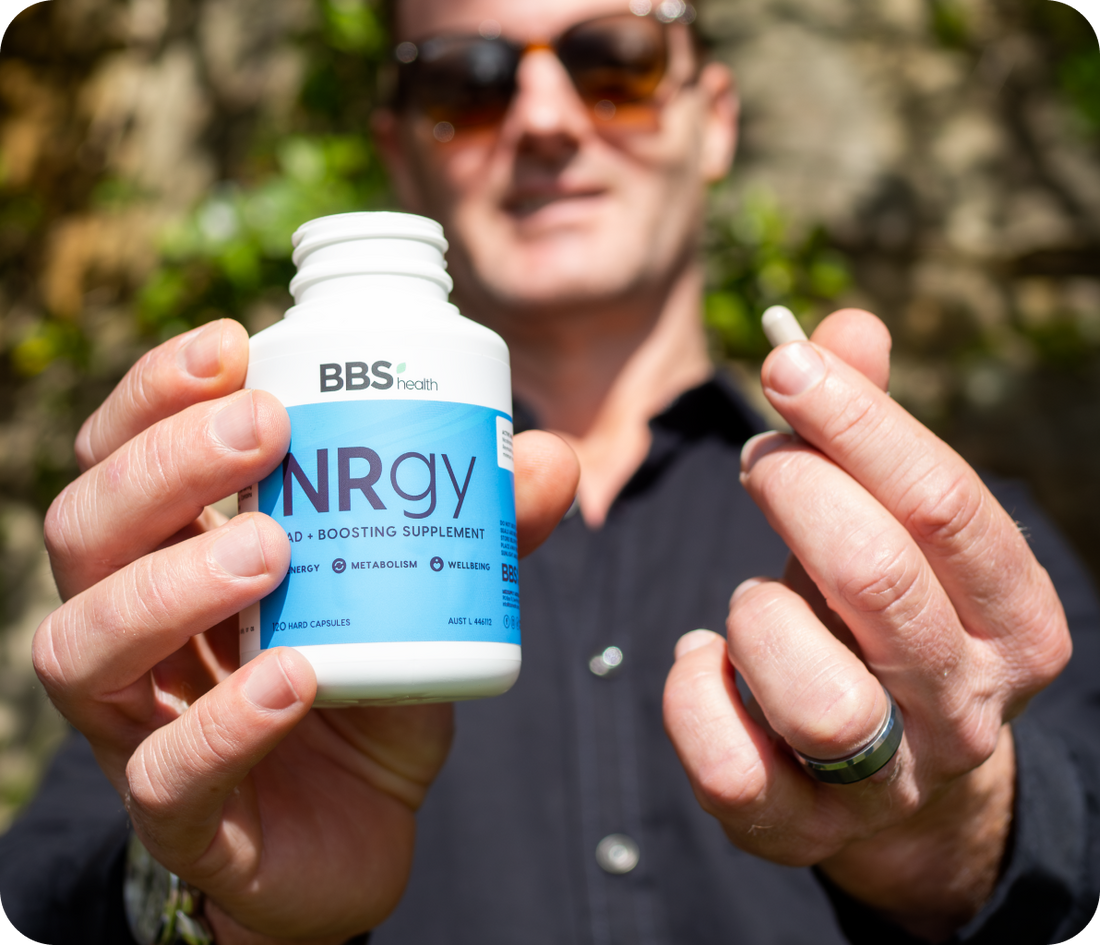What Is NAD+? The Truth Behind the Energy-Boosting Supplement

In the world of health and longevity supplements, nicotinamide adenine dinucleotide (NAD⁺) has gained significant attention for its role in cellular energy production, DNA repair, and anti-ageing benefits. But what exactly is NAD+, and does supplementing with it really work?
In this guide, we’ll explore the science behind NAD+, its benefits, and whether taking NAD+ supplements can support energy, metabolism, and longevity.
What Is NAD+ and Why Is It Important?
NAD+ (nicotinamide adenine dinucleotide) is a crucial coenzyme found in every cell of the body[1]. It plays a fundamental role in:
✅ Cellular Health & Antioxidant Defence – Maintains redox balance, reducing oxidative stress [2].
✅ Mitochondrial Function – Supports efficient cellular respiration for optimal energy production[3].
✅ DNA Repair & Longevity – Activates sirtuins, which regulate cellular repair and ageing[ 4].
✅ Energy Metabolism – Converts nutrients into ATP (adenosine triphosphate), the body’s main energy source [5].
Unfortunately, NAD+ levels decline with age, leading to slower metabolism, reduced mitochondrial function, and increased cellular damage. This has led to growing interest in NAD+ precursors as supplements to counteract this decline.
How Does the Body Produce NAD+?
Your body naturally synthesises and recycles NAD+ through three pathways:
De Novo Synthesis (from Tryptophan)
- The body produces NAD+ from tryptophan, an amino acid found in protein-rich foods [3,4].
- This process is complex and not highly efficient [3,4].
Preiss-Handler Pathway (from Niacin)
- Niacin (Vitamin B3) from diet is converted into NAD+ via multiple steps.
- Found in foods like meat, fish, dairy, and whole grains [3,4].
Salvage Pathway (from Nicotinamide & NMN/NR)
- The most efficient route, this pathway recycles nicotinamide (a vitamin B3 derivative) into NAD+ [3,4].
- NAD+ precursors like nicotinamide mononucleotide (NMN) and nicotinamide riboside (NR) are directly converted to NAD+, making them popular supplements [3,4].
Since NAD+ declines with age, boosting levels through supplementation has become a hot topic in longevity research. [6]
Do NAD+ Supplements Actually Work?
Because direct NAD+ supplementation is ineffective due to poor bioavailability, research has focused on precursors like:
✅ Nicotinamide Mononucleotide (NMN)
- Converts into NAD+ through the salvage pathway [4,7].
- Shown to boost mitochondrial function, energy metabolism, and cellular repair [8].
✅ Nicotinamide Riboside (NR)
- Another effective NAD+ precursor that increases NAD+ levels.
- May improve cognitive function, reduce inflammation, and support heart health.
Benefits of NAD+ Supplementation
Studies suggest that NAD+ precursors may:
✔️ Enhance mitochondrial energy production [8]
✔️ Support DNA repair & cellular longevity [7]
✔️ Reduce oxidative stress & inflammation [10]
✔️ Provide neuroprotective effects for brain health [9]
However, while the research is promising, NAD+ supplements are not a miracle cure. They work best in combination with a healthy lifestyle.
How to Naturally Boost NAD+ Levels
Instead of relying solely on supplements, you can increase NAD+ naturally through:
✅ Exercise – Increases NAD+ by enhancing mitochondrial function. [14]
✅ Niacin-Rich Diet – Foods like meat, fish, dairy, and whole grains support NAD+ production. [13]
✅ Intermittent Fasting – May stimulate NAD+ synthesis and mitochondrial efficiency.
✅ Proper Sleep & Stress Management – Sirtuins, which depend on NAD+, regulate circadian rhythms and cellular repair. [17]
✅ Supplementation (NMN or NR) – May help restore NAD+ levels, especially in ageing individuals. [11]
Final Thoughts: Should You Try NAD+ Supplements?
NAD+ is essential for cellular energy, longevity, and metabolic health. While NAD+ precursors like NMN and NR show promise, they should be part of a well-rounded health strategy that includes exercise, diet, and stress management.
If you’re considering NAD+ supplements, consult a healthcare provider to ensure they fit your individual needs.
What’s Your Experience?
Would you try an NAD+ supplement? Have you noticed benefits from lifestyle changes that boost NAD+? Share your thoughts in the comments!
References
- Covarrubias, A.J., Perrone, R., Grozio, A., & Verdin, E. (2021). Nature Reviews Molecular Cell Biology, 22, 119–141.
- Amjad, S., Nisar, S., Bhat, A.A., et al. (2021). Molecular Metabolism, 49, 101195.
- Houtkooper, R.H., Cantó, C., Wanders, R.J., & Auwerx, J. (2010). Endocrine Reviews, 31, 194–223.
- Johnson, S., & Imai, S.-I. (2018). F1000Research, 7, 132.
- Nelson, D.L., & Cox, M.M. (2017). Lehninger Principles of Biochemistry, 7th Edition, W. H. Freeman and Company.
- Pittelli, M., Felici, R., Pitozzi, V., et al. (2011). Molecular Pharmacology, 80, 1136–1146.
- Herceg, Z., & Wang, Z.Q. (2001). Mutation Research, 477, 97–110.
- Zhang, H., Ryu, D., Wu, Y., et al. (2016). Science, 352, 1436–1443.
- Houtkooper, R.H., Pirinen, E., & Auwerx, J. (2012). Nature Reviews Molecular Cell Biology, 13, 225–238.
- Mendelsohn, A.R., & Larrick, J.W. (2017). Rejuvenation Research, 20, 244–247.
- Gomes, A.P., Price, N.L., Ling, A.J.Y., et al. (2013). Cell, 155, 1624–1638.
- Carrico, C., Meyer, J.G., He, W., et al. (2018). Cell Metabolism, 27, 497–512.
- Canto, C., Jiang, L.Q., Deshmukh, A.S., et al. (2010). Cell Metabolism, 11, 213–219.
- Gurd, B.J. (2011). Applied Physiology, Nutrition, and Metabolism, 36, 589–597.
- Jang, S.-Y., Kang, H.T., & Hwang, E.S. (2012). Journal of Biological Chemistry, 287, 19304–19314.
- Ramis, M.R., Esteban, S., Miralles, A., et al. (2015). Mechanisms of Ageing and Development, 146-148, 28–41.
- Bai, P., & Canto, C. (2012). Cell Metabolism, 16, 290–295.






